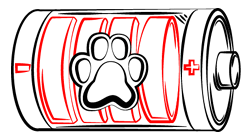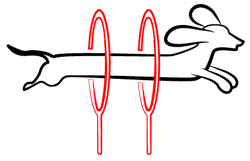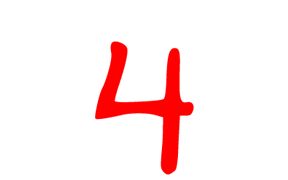
Paws ‘N’ Pups Quickview
Size
| Energy Level
| Trainability
| Paws ‘N’ Pups Rank
|
Characteristics
| Physical Characteristics: Height: 18-23” Weight: 40-65 lbs. Energy Level: High | Colors: The Chusky is found in the following colors:
|
Health & Longevity
Average Life Span: 10-13 years
The Chusky is a cross between a Chow Chow and a Siberian Husky. Like most hybrid dogs, he is not prone to the hereditary health problems affecting many breeds. However, there are a few health issues that may impact a small amount of Chusky Dogs.
Hip dysplasia has been occasionally reported in Chusky Dogs. Hip dysplasia occurs when the thigh bone cannot fit properly into a malformed hip joint. The condition leads to pain, discomfort, and limping. In more severe cases, hip dysplasia can cause arthritis or even lameness, and surgery may be required to treat this degenerative condition. Dogs with hip dysplasia should not be bred, so ensure that your Chusky puppy’s parents have no history of the condition. Although it is hereditary, hip dysplasia can be triggered by rapid weight gain or injury, like falling on something slippery. Excessive jumping in puppies whose joints are still developing can also trigger hip dysplasia.
The Chusky may experience some minor eye problems, and some are born without middle teeth, which leads to specific dietary needs. If this is the case with your Chusky, you will have to consult with your veterinarian to develop a specialized diet.
The Chusky has a lifespan of 10-13 years, which is a bit shorter than the lifespan of most hybrid dogs.
Temperament & Train-ability
The Chusky is affectionate, loyal, and loving. He is energetic and extremely protective of his family. Although he makes an excellent family companion, the stubborn Chusky is not recommended for a first-time dog owner.
It is essential for a Chusky Dog to get plenty of exercise each day. He needs to walk for at least an hour each day, but he will be happier with more activity. He will do best with an active family who can take him running, hiking, or swimming. Chusky Dogs love water, so swimming can be a fun and rewarding activity for this breed. Due to their thick coats, the Chusky is best suited to colder climates. If your Chusky will be spending a lot of alone time outdoors, be sure the yard is securely fenced, as he may wander off. However, it is crucial for the social Chusky to get plenty of family time each day. If he is not able to interact with his family as often as he likes, he may become depressed and destructive.
The Chusky gets along well with children, and he is usually good with other dogs as well. Although he loves his family dearly, the Chusky can be wary of strangers. He makes a good guard dog who will bark to warn his family of danger and is willing to go to great lengths to protect his family. In fact, the Chusky may become overly protective of his family if not properly trained and socialize. This needs to be avoided because it can lead to unnecessary aggression in a misguided attempt to protect his people, especially children in the family.
Training a Chusky is hard but essential, and the process should begin immediately. The Chusky is stubborn and can try to assert dominance if you do not firmly establish yourself as “pack leader.” Without proper training, he may be aggressive, destructive, and rowdy. Use positive reinforcement techniques like verbal praise, favorite treats, and extra playtime. Clearly, firmly, and consistently establish your rules and expectations. You will need to patiently and persistently train your Chusky.
Due to the Chusky’s issues with separation anxiety, crate training is also a must. If you begin crate training your Chusky when he is young, he will become more accustomed to being away from his family at times. He will, therefore, be less upset when you are away, and he will be less likely to become destructive.
Grooming
The Chusky has a long, dense coat that sheds heavily and requires regular grooming. Although the Chusky’s coat always sheds a lot, he experiences hefty sheds seasonally. You may need to brush your Chusky daily, even when he is not experiencing a period of substantial shed. Also be prepared to spend a lot of time vacuuming behind your dog.
Bathe the Chusky as needed, and trim his nails regularly. Check his ears frequently for signs of infection including redness, tenderness, and odor. Ensure that excessive buildup of dirt, debris, and wax does not occur. Brush his teeth 2-3 times weekly to prevent bad breath and ensure healthy gums. The Chusky Dog does not like being subjected to any form of grooming, so begin exposing him to these processes at a young age.
Diet
On average, the Chusky should consume 2.5-3 cups of a high-quality dog food daily. Like all large dogs, it is very important for the Chusky to have a nutritionally balanced diet. Fish based food can be especially good for the Chusky. Due to their long coats, the Omega 3s and fatty acids found in fish like salmon can help maintain the natural oils in their skin.
Ensure that your Chusky has access to clean, fresh drinking water at all times, especially if you are living in a warmer climate.
Looking for a Chusky?
 Find A Chusky Breeder |  Chusky Puppies For Sale |  Adopt A Chusky |
Cost
The average cost for a Chusky will be $400-$800. Prices will vary according to breeder location, gender, and pedigree.
If you choose to adopt a Chusky, expect adoption fees to cost up to $175.
Paws ‘N’ Pups Ranking
Paws ‘N’ Pups ranks every breed out of 4 with 1 being easiest to integrate into your life and 4 being the toughest – The lower the ranking the better.
Ranking takes into account a few basic factors including cost, skill level needed, high vs low maintenance and how critical regular training is to success. The Chusky ranks a 4. A Chusky can be a wonderful companion dog because he is extremely affectionate, loving, and loyal. However, his owner must be prepared to put a lot of time and effort into caring for him: he needs plenty of exercise and plenty of time with his family, and training him, although essential, can be tough. He needs early socialization and crate training, and he sheds very heavily.
Breeds Similar To Chusky
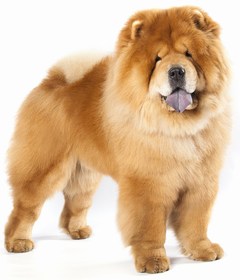 Chow Chow | 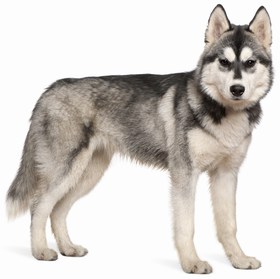 Siberian Husky | 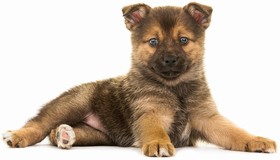 Pomsky | 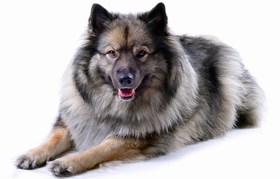 Keeshond |


